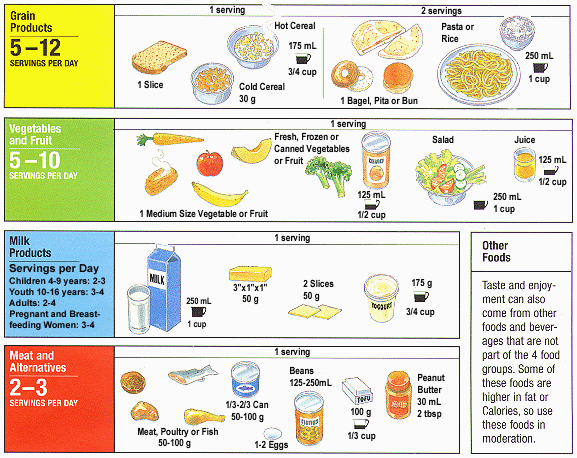
Source Canadian Government advice on nutrition for public distribution
Pregnancy exerts a powerful and lasting influence on the health of the mother, the infant, future children and her family. A good way to improve maternal and fetal health is to optimize health throughout the childbearing years, which includes the time before, during and between pregnancies.
You will need to add add additional calcium, vitamin D, iron and folate. You can do this by eating more milk products, meat and meat alternatives, dark green vegetables, whole grain and enriched grain products.

Source Canadian Government advice on nutrition for public distribution
Energy = Calories
You need food for
energy. Energy is measured in Calories, kilocalories (kcal) or Kilojoules (kJ).
So more Calories give you more energy. If you follow the Food Guide, you will
get between 1800 and 3200 Calories each day. while pregnant its important to
increase your calorie intake.
It's important to choose your food wisely. For example, women should choose foods high in iron such as beef or game meat, whole grain and enriched cereals, peas, beans and lentils. Let the statements on the Food Guide help you make your choices. If you are still hungry or losing weight may need more servings from the 4 food groups and other foods.
Folate:
Women need folate during pregnancy to support their expanding blood volume and
the growth of maternal and fetal tissues, and to decrease the risk to the fetus
of neural tube defects. They should continue to take a folic acid supplement in
conjunction with a healthy eating pattern.
Iron: Women need additional iron during pregnancy to increase the maternal red blood cell mass. Assume that pre-pregnancy stores are inadequate and advise a low-dose iron supplement in conjunction with a healthy eating pattern during the second and third trimester.
Calcium/Vitamin
D:
Pregnant and lactating women need calcium and vitamin D to maintain the
integrity of their bones, while providing for the skeletal development of the
fetus. Many women do not consume enough dietary calcium to meet the needs of
pregnancy. While overt signs of vitamin D deficiency are not widespread in
Canada, women who consume no fluid milk and/or have limited exposure to sunlight
may be at risk for poor vitamin D status. Encourage women to include more good
sources of calcium and vitamin D such as milk products. For some women, calcium
and/or vitamin D supplements may be appropriate
Essential
Fatty Acids:
Pregnant women should consume adequate amounts of essential fatty acids (EFAs),
linoleic acid and -linolenic acid daily for proper fetal neural and visual
development. Foods containing significant amounts of EFAs include common
vegetable oils.
Food
Safety
Some food safety issues are a special concern during pregnancy: caffeine,
artificial sweeteners, herbal teas and other herbal preparations, food-borne
illnesses, chemical contamination of food and water contamination. Health
practitioners/educators should help women understand these issues, assess their
personal risks and make informed choices.